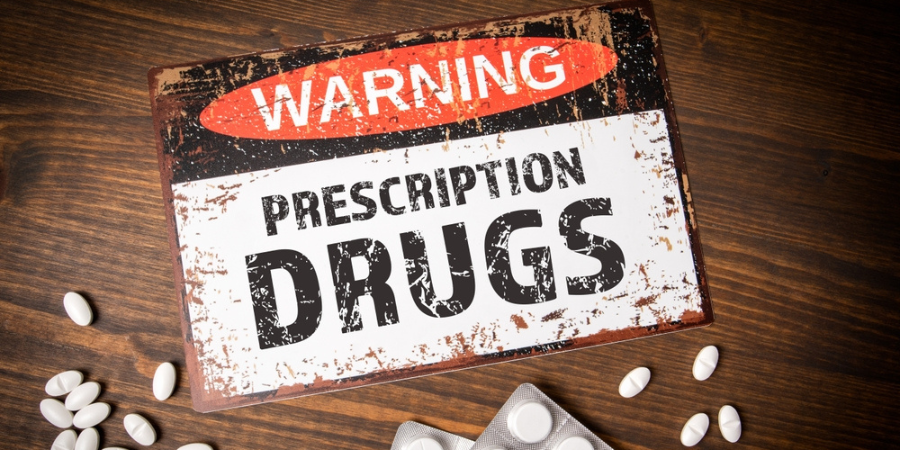
Written by:

Medically Reviewed by:
Last Updated:
February 25th, 2025
Prescription Drug Addiction | Types, Symptoms & Effects
Around 11.5 million adults were using prescription medication by 2018. When used as directed, prescription drugs can help many people to lead less painful lives. But what happens when prescription medication is abused?
By understanding the effects of prescription drug abuse and addiction and learning how to recognise the signs and symptoms of it, you can access effective support and achieve lasting sobriety.
Five fast facts about prescription drug addiction
- The unnecessary prescription of dependency-forming medications was estimated to have cost the NHS around £1.5 billion between 2015-2018.
- Much of the harm done by prescription drug misuse is due to the false myth that prescription drug use and abuse are generally safe since healthcare providers prescribe them.
- Addiction to prescription medication can develop even if it is taken as directed; any repeated exposure comes with the risk of addiction
- A quarter of British adults were prescribed either opioids, benzos, antidepressants, z-drugs, or gabapentinoids in 2018.
- Doctor shopping’ is when a person visits multiple doctors to obtain more prescriptions and sustain their addiction to a drug
What is prescription drug addiction?
Prescription drug abuse refers to taking medicine in any way other than how a doctor prescribed it or taking it for nonmedical use. This could involve crushing and snorting drugs, using others’ prescriptions to obtain more of the drug, forging a prescription, or using the drugs to achieve a certain effect instead of treating a medical condition.
Abusing prescription drugs increases your chances of developing an addiction to them, which comes with similar signs and symptoms to that of illicit drug addiction. Someone suffering from a prescription drug addiction might have tried unsuccessfully to quit alone or be engaging in risky behaviour to attain more drugs.
Prescription drug addiction can be overcome by Linwood House’s treatment programmes which can help you, or a loved one, put an end to the dangerous effects that come with it.
What types of prescription drug can I get addicted to?
There are many different kinds of prescription drug addiction. Some of the most common are:
Antidepressants
Antidepressants come in many forms, and antidepressant addiction can result in difficult withdrawal symptoms. Click here to find out more about addiction to antidepressents.
Benzo addiction
Benzodiazepines are commonly prescribed for anxiety but have a high risk for addiction. Learn more about the signs and risks of benzo addiction by clicking the button below.
Opioid addiction
Opioid addiction can be highly damaging but often starts with a valid prescription. These include medicines like codeine and morphine, intended to treat pain but are often abused.
Sleeping pill addiction
Sleeping pill addiction often occurs when medicine intended to treat sleep disorders, anxiety, or panic attacks is abused or used extensively. Click the button below to learn more.
Stimulant addiction
Stimulants may be prescribed for conditions such as ADHD, but stimulant addiction can lead to long-lasting changes in the brain. Click on the link below to learn more about addiction to stimulants.
What are the effects of prescription drug addiction?
Each prescription drug class has individual effects on the body and mind, but they are all related to common general harm.
If you or a loved one is struggling with abuse and prescription drug addiction, seeking treatment is always a good decision. Apart from an overdose, the different classes of prescription drugs can affect your health in the following ways:
- Stimulants cause a mimicking of the body’s natural dopamine and norepinephrine. This creates euphoria but also constricts blood vessels and increases blood glucose. When misused, stimulants can cause dangerously high body temperature and heart rate.
- It also comes with sleep problems, psychosis, paranoia, hostility, a loss of appetite, and weight loss. Abusing ADHD medications may lead to heart failure or seizures.
- Opioids can cause confusion, drowsiness, low blood pressure, nausea, and constipation. Large doses of opioid medication can result in a slow breathing rate or cause you to stop breathing completely. It can also lead to coma and death.
- Abusing CNS depressants, like sedatives or anti-anxiety medications, may lead to memory problems. Abruptly stopping the use of these drugs can also lead to seizures, which is why detox is best done with medical supervision.
Recognising if a loved one Is addicted to prescription drugs
It isn’t always easy to tell if someone is addicted to prescription drugs. Often, they will try to hide it or even lie about it. Some signs of prescription drug addiction include:
- Appetite changes
- Loss of interest in normal hobbies
- Insomnia
- Evasiveness or dishonesty around activities
- Slurred speech
- Digestive issues
- Confusion and poor coordination
- Poor decision-making
- Mood swings involving anxiety, agitation and depression
A person addicted to prescription drugs may need larger and larger doses of the medication to achieve the same effect, meaning that the body becomes used to the drug and builds tolerance to it. They may experience strong cravings for the drug and go through withdrawal symptoms when attempting to stop or when they do not have access to more of the drug.
These effects cause drug-seeking behaviour, making someone engage in risky and criminal activities to sustain their prescription drug addiction. Someone addicted to prescription medication will compulsively seek the drug despite the negative consequences on themselves or others.
This may include manipulating or stealing from family members. It may be difficult to identify, but sometimes the closest ones to a person suffering from addiction attempt to help or protect them but instead enable their drug use. Actions like constantly lending money to a loved one who is spending it on drug use or being in denial of their need for treatment can sustain their addiction.
The next step
Luckily, prescription drug addiction can be overcome, and we offer a prescription drug rehab programme at Linwood House.
If you are concerned about prescription drug addiction, do not hesitate to seek help. Reach out to Linwood House’s support team, which is available 24/7, to answer any of your questions and concerns and provide more information.




